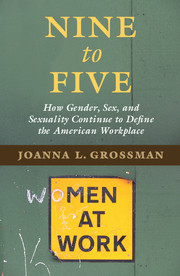Book contents
- Frontmatter
- Dedication
- Contents
- Foreword
- Acknowledgments
- Introduction
- PART I WHAT IS SEX DISCRIMINATION?
- PART II SEXUAL HARASSMENT
- PART III PREGNANT WOMEN AND MOTHERS AT WORK
- 31 Pregnant Truckers and the Problem of Light-Duty Assignments
- 32 A Big Win for Pregnant Police Officers
- 33 Undue Burden
- 34 Hard Labor: New Pregnancy Discrimination Guidance from the EEOC
- 35 Forceps Delivery: The Supreme Court Narrowly Saves the Pregnancy Discrimination Act in Young vs. UPS
- 36 The Pregnancy Discrimination Act Reaches Advanced Maternal Age
- 37 The Pregnant Workers’ Fairness Act: A Time for Change?
- 38 The Supreme Court Deals a Blow to Once-Pregnant Retirees
- 39 If She Does Not Win It Is a Shame
- 40 Must Employers Who Cover Prescriptions Cover Contraception?
- 41 Fertile Ground for Discrimination
- 42 Can a Woman Be Fired for Absenteeism Related to Fertility Treatments?
- 43 Is Lactation Related to Pregnancy?
- 44 A Victory for Families, but Hardly a Panacea
- 45 A Small Step in the Right Direction: The Family and Medical Leave Act at Twenty
- 46 “Best Practices” to Promote Work-Family Balance
- PART IV FEMALE BREADWINNERS AND THE GLASS CEILING
- Conclusion
- Notes
- Index
45 - A Small Step in the Right Direction: The Family and Medical Leave Act at Twenty
from PART III - PREGNANT WOMEN AND MOTHERS AT WORK
Published online by Cambridge University Press: 05 May 2016
- Frontmatter
- Dedication
- Contents
- Foreword
- Acknowledgments
- Introduction
- PART I WHAT IS SEX DISCRIMINATION?
- PART II SEXUAL HARASSMENT
- PART III PREGNANT WOMEN AND MOTHERS AT WORK
- 31 Pregnant Truckers and the Problem of Light-Duty Assignments
- 32 A Big Win for Pregnant Police Officers
- 33 Undue Burden
- 34 Hard Labor: New Pregnancy Discrimination Guidance from the EEOC
- 35 Forceps Delivery: The Supreme Court Narrowly Saves the Pregnancy Discrimination Act in Young vs. UPS
- 36 The Pregnancy Discrimination Act Reaches Advanced Maternal Age
- 37 The Pregnant Workers’ Fairness Act: A Time for Change?
- 38 The Supreme Court Deals a Blow to Once-Pregnant Retirees
- 39 If She Does Not Win It Is a Shame
- 40 Must Employers Who Cover Prescriptions Cover Contraception?
- 41 Fertile Ground for Discrimination
- 42 Can a Woman Be Fired for Absenteeism Related to Fertility Treatments?
- 43 Is Lactation Related to Pregnancy?
- 44 A Victory for Families, but Hardly a Panacea
- 45 A Small Step in the Right Direction: The Family and Medical Leave Act at Twenty
- 46 “Best Practices” to Promote Work-Family Balance
- PART IV FEMALE BREADWINNERS AND THE GLASS CEILING
- Conclusion
- Notes
- Index
Summary
Twenty years ago, Congress passed the FMLA, the first federal law to guarantee (some) workers unpaid leave when they are forced to take time off to care for themselves or close relatives when seriously ill, or to care for a newly born or adopted child. The bill that ultimately became law had been fought over for eight years and, during that time, had suffered a series of withering cuts until it was anemic enough to gain majority support in Congress.
The FMLA added important protections for eligible employees, but it fell short of its aspiration to force employers to provide at least minimal accommodations for workers’ caretaking obligations and serious illnesses. Many workers are not eligible for FMLA leave, and those who are often cannot afford to take it. And although it provides men and women the same opportunity to take caretaking or parenting leave, it has done little to alter the disproportionate burden of caretaking that falls on women in most families. Nor did it improve the lives of workers enough to rescue the United States from its dismal ranking among industrialized countries when it comes to workers’ medical and caretaking leave.
After twenty years, it's time to expand the FMLA's protections to facilitate broader access to affordable leave in times of need. The current system has proved helpful in that it has established a norm that employees should not risk job loss due to leave necessitated by short-term health crises or the new obligations of parenting. It has also proven that the wildly exaggerated fears about the burden on employers of the cost of accommodating such leave, which drove much of the eight-year debate before the FMLA finally passed, were just that – wildly exaggerated. Employers report that they can administer FMLA leave with little cost or trouble. It's now time to take the next step.
THE FMLA: WHAT IT DOES AND DOESN'T OFFER
The FMLA gives eligible employees the right to twelve weeks of unpaid leave per year such leave is needed to care for a newborn or newly adopted child, to care for a seriously ill family member, or to attend to one's own serious health condition.
- Type
- Chapter
- Information
- Nine to FiveHow Gender, Sex, and Sexuality Continue to Define the American Workplace, pp. 259 - 266Publisher: Cambridge University PressPrint publication year: 2016



